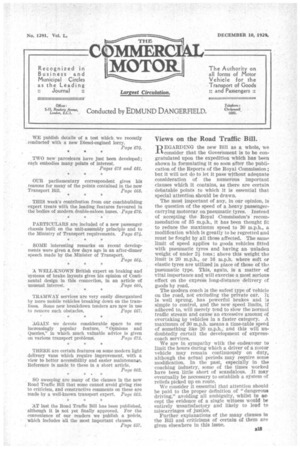Views on the Road Traffic Bill.
Page 49

If you've noticed an error in this article please click here to report it so we can fix it.
EGARDING the new Bill as a whole, we -I"'consider that the Government is to be congratulated upon the expedition whiCh has been shown in formulating it so soon after the publication of the Reports of the Royal Commission ; but it will not do to let it pass without adequate consideration of the numerous important clauses which it contains, as there are certain debatable points to which it is essential that special attention should be drawn.
The most important of any, in our opinion, is the question of the speed of a heavy passengercarrying motorcar on pneumatic tyres. Instead of accepting the Royal .Cominission's recommendation of 35 m.p.h., it has been thought fit to reduce the maximum speed to 30 m.p.h., a modification which is greatly to be regretted and must be fought by all those affected. The same limit of speed applies to goods vehicles fitted with pneumatic tyres and having an unladen weight of under 2/ tons ; above this weight the limit Is 20 vo.p.h., or id m.p.h. where soft or elastic tyres are utilizedin place of those of the pneumatic type, This, again, is a matter of vital importance and will exercise a most serious effect on the express long-distance delivery of goods by road.
The modern coach is the safest type of vehicle on the road, not excluding the private car. it is well sprung, has powerful brakes and is simple to control, and the new speed limits, if adhered to, will merely tend to slow the normal traffic stream and cause an excessive amount of overtaking by vehicles in a faster category. A maximum of 30 m,p.h. means a time-table speed of something like 20 m.p.h.,' and this will undoubtedly curtail the development of expresscoach services.
We are in sympathy with the endeavour to limit the hours during which a driver of a motor vehicle may remain continuously on duty, although the actual periods may require some modification. in the past, especially in the coaching industry, some of the times worked have been little short of scandalous. .It may eventually be necessary to establish a system of reliefs picked up en route. We consider it essential that attention should be paid to the proper definition of "dangerous driving," avoiding all ambiguity, whilst to accept the evidence of a single witness would be entirely unsatisfactory and likely to lead to miscarriages of justice. Further, explanations of the many clauses in the Bill and criticisms of certain of them are given elsewhere in this issue.
























































































































